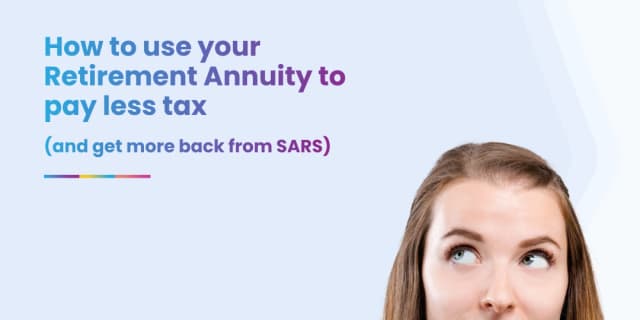Saving towards retirement
Turn your tax into a bonus hack - Rands & Sense by 10X
Carl Thomen
11 February 2025
At 10X we know that tax is a huge deal for South Africans. That's why we asked Nicci from TaxTim to chat to us about the most common tax questions they get. Below, you can see a summary of the conversation. If you're concerned about how tax impacts your investments, talk to a 10X consultant free of charge.
Let’s start with discussing retirement savings – can you explain how taxpayers can take advantage of this tax benefit while saving for retirement?
- Contribute up to 27,5% of your taxable income annually towards a retirement fund (pension, provident or Retirement Annuity), capped at R350,000 per year
- Contributions in excess of your limit or R350K cap, are rolled-over and deducted the following years
- Contributions are tax deductible
- Growth on your money tax free: Pay zero tax on investment returns. No tax on interest, dividends, or capital gains.
- Access a tax-efficient lump sum at retirement: When you retire you can take up to 1/3 of your retirement fund as a lump sum. Once-off R500K exemption. The 2/3 balance is taken as annuity income/pension.
- Any excess savings, you can contribute to a RA and reduce your tax bill for 2025
- Remember to include your RA details in your annual tax return. Look out for the tax certificate (IT3f)

Can you give us more information about Tax-free Savings Accounts – how they work, limits to be aware of and any other tips?
- It is a savings account where money is invested in a combination of financial products and there is no tax on the investment income earned (interest, dividends, capital gains)
- Monthly R36,000, lifetime limit of R500,000, investment horizon of about 14 years
- Can open accounts for minor children, they have their own limit
- Can open multiple accounts but be aware of R36K limit in total across them all
- SARS penalty of 40% if you exceed the annual limit
Can you tell us about some other ways to save tax. What about donations?
- Donation to certain charities may also be allowed a deduction for tax purposes.
- These charities must registered with SARS as Public Benefit Organisations (PBO).
- These are non-profit organisations which are exempt from paying tax in South Africa.
- Your deduction is limited to 10% of your taxable income. Make sure you request the s18A tax certificate from the charity so that you can include the relevant details in your tax return.
- SARS will want to know the PBO number which should reflect on the certificate
- Tip: If you contribute to a neighbourhood watch, some of these are set up as PBOs
Since the Covid pandemic, many employees work from home and there’s been a lot of talk about a tax saving for home office costs. How does the home office deduction work? What costs are claimable?
- Must work more than 50% of your time at home, and have a separate home office set up for work purposes, exclusive use
- Expenses that can be claimed: rent, electricity, rates and taxes and even cleaning (no longer mortgage interest from 2023)
- Internet/data/fibre/telephone can’t be claimed for salaried employees, only for commission earners
- SARS specifically said no to water, sewerage and refuse
- You can also claim wear and tear on any office equipment you may have bought, such as computers, furniture, printers etc.
- The key is to keep accurate records of your expenses and calculate the percentage of your home used for work purposes and claim accordingly.
- You will need to provide SARS with these detailed calculations as well as photos of your home office, plans of your house which clearly shows your home office and square meterage, letter from your employer confirming you do work from home and proof of all your expenses (utility bills, rental contract etc).
- 'Office space' claims can have an effect on Capital Gains Calculations when you sell your house.
What about medical costs, how does the tax saving work? I know if you contribute to a medical aid, there’s a fixed monthly benefit per dependent but what about other medical expenses you pay personally that are not covered by medical aid?
- You can earn a further additional medical rebate for medical expenses paid personally, which are not reimbursed by the medical aid.
- These ‘qualifying medical expenses’ are prescription medicines only and appointments with registered medical practitioners. ‘Over the Counter’ meds (e.g vitamins etc ) are not considered to be qualifying expenses.
- Keep all invoices and proof of payments. Need to provide SARS with a schedule listing all expenses with proof of payment for each one.
- SARS is also asking for the actual prescription with the Rx code on it, so be sure to keep this as well
- You need to spend a lot to receive this additional medical rebate. Misconception that it’s a straight deduction off your taxable income like other deductions. There is a complicated formula to work out medical rebate and it’s linked to your taxable income.
Can you tell us about traveling for work and how that tax deduction works? When would someone get a tax refund due to their travel expenses?
- If you are a salaried employee, you can only claim a travel deduction for business mileage if you earn a travel allowance from your employer or you drive a company car
- Must have specific codes on your IRP5 for these benefits
- Normally 80% of your travel allowance is taxed each month – assumption is that you are travelling 80% for personal and 20% for business
- You must keep a detailed logbook of your business mileage where you record the destination and reason for every trip, record personal mileage too
- Submit travel details in your annual tax return and if you travelled more than 20% for business, then you should get some tax back (and vice versa)
- If you don’t keep a record of your mileage/have no logbook – you will need to pay tax in when you submit your tax return
NB: driving between your home and office is considered to be personal travel
Moving away from tax savings, can you talk to us about having a side-hustle and how the tax works. What if I earn a salary and freelance on the side? How do I declare these extra earnings to SARS?
- Any extra income you earn is added to your salary and the total income you earn is taxed per the normal tax tables for individuals
- South African tax tables are set up as a sliding scale – so the more income you earn, the more tax you pay
- There is no special freelance tax rate. Additional income is taxed using the same rates as your salary.
- It does not matter if this income is earned locally or from abroad. If you are living and working in South Africa and are considered a South African tax resident, then you need to declare your worldwide earnings to SARS.
- There is a section in the tax return for Local Business income and expenses e.g office rent, salaries to 3rd parties, internet, telephone, wear and tear on business assets. Etc
NB: freelancers are always provisional taxpayers
Provisional tax is confusing for many people. Who is a provisional taxpayer, how does the system work?
- Unlike salaried employees, freelancers are provisional taxpayers, which means they won’t have PAYE deducted from their income. They need to register with SARS as provisional taxpayers and file provisional returns (IRP6) with SARS twice during the tax year (August and February).
- You will need to estimate your taxable income (gross income less business expenses) and pay tax on this amount during the tax year
- It’s important to set aside some money each month so that you have funds to pay when it’s time to settle your tax bill.
- What is important is that in addition to the two provisional returns (IRP6) where you estimate your earnings for the year, you also need to submit an annual tax return (ITR12) (after the tax year end) where you report all your actual income and expenses for the year. It’s crucial to keep detailed records of your earnings and your expenses too.
If you earn investment income, are you a provisional taxpayer?
- Not always – there are thresholds that apply
- Your taxable income from investments (dividends, interest) and rental must be greater than R30,000 in order to be a provisional taxpayer
- If you earn freelance income, you are automatically a provisional taxpayer
- Viewer question: How does tax on international investments work?
Crypto and tax: just now someone is making money trading, or has held for a few years and now wants to realise some decent gains. What do they need to understand?
- Crypto transactions are taxed according to existing South African tax laws
- SARS regards crypto as an intangible asset
- Crypto profits are either taxed according to Capital Gains tax principals or as revenue
- Need to look at your intention when buying the crypto in the first place and how long you have held it for
- If you actively buying and selling crypto for profit making purposes then you regarded as ‘trading’ and you need to report the profits to SARS in your tax return
- Tax is calculated based on normal tax tables, just like your salary
- If you buying with a 3-5 year investment horizon plan, then the profit on the disposal would be taxed as a capital gain
- If you are trading crypto and realising profits, need to pay provisional tax during the year and file IRP6 returns
- Crypto tracking and record keeping can get complex - there are some handy Apps around to track trading activity which makes things easier when you come to do your tax
- Crypto transactions are not anonymous. SARS are working with service providers and exchanges to receive 3rd party data in all areas, including crypto
Can you give us some other tips to keep on top of your tax obligations?
- Record keeping is very important because SARS often requests supporting documents after you submit your return. Especially in cases where you claimed home office, travel, extra medical costs and also if you earned rental income or freelanced
- Always keep your invoices, proof of payments/receipts, track expenses on a spreadsheet as well
- Probably best to photograph the paper documents and store in a folder on your computer
- Only business expenses are deductible so it’s important to keep personal expenses separate – consider opening a separate bank account for freelance activities
- Stay informed of the tax deadlines – provisional deadlines, and also annual return filing deadlines. SARS are very quick to slap on penalties even if you just a day late. administrative penalties can range from R250 to R16000 per month until your tax return is filed.
Share this article:
Disclaimer
Join 50,000+ smart investors
Get valuable investment insights as well as access to webinars and podcasts on tax, retirement, and strategies to grow your wealth.
Related articles
How can we 10X Your Future?
Begin your journey to a secure future with 10X Investments. Explore our range of retirement products designed to help you grow your wealth and achieve financial success.


